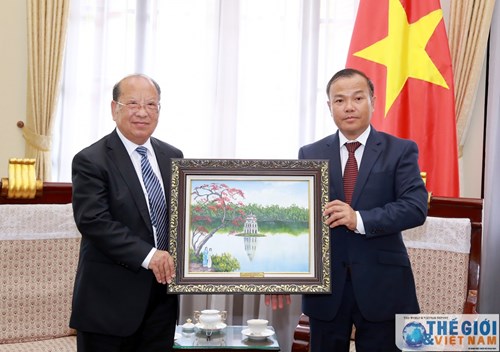OVs join hands in various fields
The consistent policy of attaching importance to the resources from the OVs communities in the national construction and development has been realized effectively, shown especially in the increasingly closer connection between OVs and the homeland, bringing about practical results. There has been increasing participation of OVs in the nation’s political, economic, and social life, as OVs have been making more direct proposals to leaders of both central and local agencies in many fields. At present, there are four OVs from the US, Japan, Singapore and France in the Economic Advisory Board of the Prime Minister and Vietnam has set up an initial database of OVs so as to be able to quickly mobilize resources from OVs when needed.
    |
 |
|
Deputy Foreign Minister Vu Hong Nam (R) presenting a gift to Prof. Yang Dao |
Specific policies on attracting and developing resources of OV intellectuals and businesspeople of the Party and State have helped gather a growing number of OVs returning home to contribute to the construction of the homeland. In 2017, the number of overseas Vietnamese intellectuals’ returns was estimated at about 300 and the OVs have engaged in a variety of activities in a number of areas, such as the digital economy or new technologies. A number of ideas in areas such areas as the economy, society, start-ups, information technology, high technology, education, etc. have been proposed via a series of events organized by OVs themselves with an aim to contribute to the country’s development.
A favorable environment for young OV intellectuals needed
According to Dinh Viet Tung, a young OV intellectual living in Paris, most of the young OV intellectuals want to contribute to the development of Vietnam in a variety of fields. The fast-growing trend in the world and also the common interest of many people these days is the digital economy. Tung held that Vietnam should join this common trend in the development of the world as well as the region. He also said it is wise that the Government has devised long-term policies, plans and road-maps to develop the economy in this direction.
The question is “How to attract more OV intellectuals to make more contributions to the country?” Tung said, “In fact, young intellectuals do not demand much. They simply want to have a favorable environment to develop their ideas. They want people to listen to and exchange their ideas with so that their ideas can be applied in Vietnam.”
2017 was also the year when there were a number of young OVs who, having been born, grew up and studied overseas, are now voluntarily returning to Vietnam to work. They include, for example, a young OV turning down a higher income abroad to come back to Vietnam to do research in applying IT to the management of the health sector and another young OV from Poland who is working on cultivating medicinal herbal plants to aid in the fight against common infectious diseases, and more.
Attention to OVs’ benefits, enhancement of OV-homeland ties
Sound policies on OVs not only contribute to effectively mobilizing resources from overseas for the development of the country, but also help strengthen the great national unity bloc. Besides the goal of national development, the OV affairs of the State also pay attention to the benefits of OVs, serving to further strengthen the OV-homeland ties while evoking the interest and responsibility of OVs towards the nation.
The year 2017 also saw the widespread implementation of the OV affairs at all levels and sectors of Vietnam. Ministries and agencies of the Government and localities all developed their own action plans on OVs. As a result, OVs enjoyed simpler procedures in setting up businesses and living in Vietnam. The proposals of OVs on visa, legal information, investment procedures, etc. were heeded and resolved principally in the increasingly improved directions, further facilitating OVs when returning to the homeland. For example, authorities in Ba Ria-Vung Tau province opened a hotline for OV investors.
OV communities have also been listened to by high-ranking Vietnamese officials via diplomatic activities. Vietnamese leaders always ask leaders of the host countries to create favorable conditions for the Vietnamese communities in their employment and everyday living. The teaching and learning of the Vietnamese language have been better developed in host countries of OV communities.
Prof. Yang Dao, a well-known overseas Vietnamese from the Hmong community in the United States, just returned to Vietnam for visit and was invited to the “Homeland Spring 2018”. He said that it was his third return to Vietnam after moving to the United States and he was proud to see the enormous changes in Vietnam over recent times. Particularly, the Government of Vietnam has devised a number of policies and guidelines to support and develop ethnic minority communities.
Translated by Huu Duong